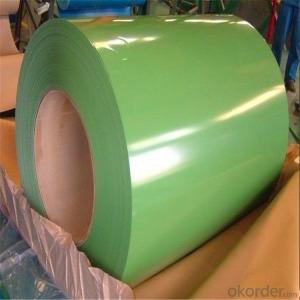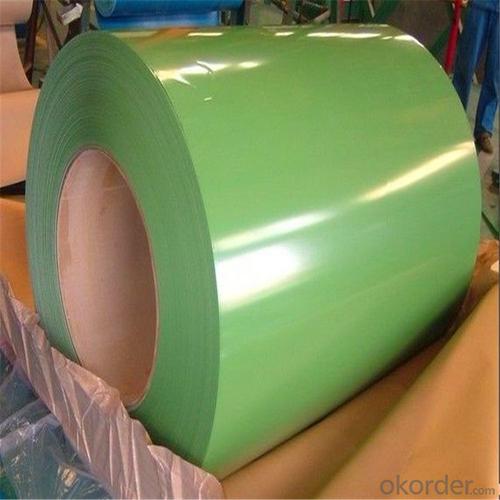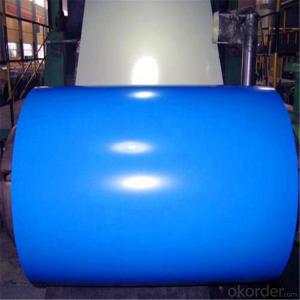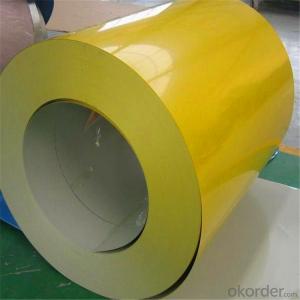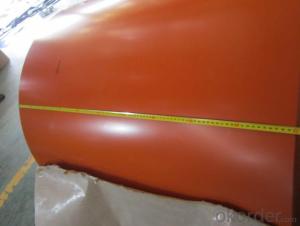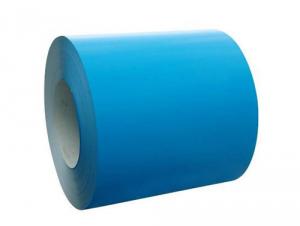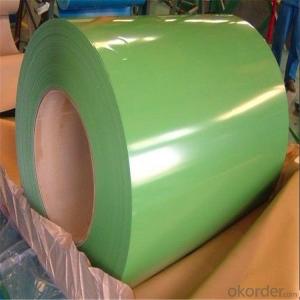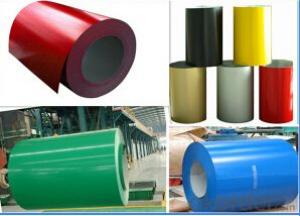PPGI Prepainted Galvanized Steel Coil for PU Panel
- Loading Port:
- Tianjin
- Payment Terms:
- TT OR LC
- Min Order Qty:
- 100 m.t.
- Supply Capability:
- 500000 m.t./month
OKorder Service Pledge
OKorder Financial Service
You Might Also Like
Specification
PPGI Prepainted Galvanized Steel Coil for PU Panel
Description of PPGI Prepainted Galvanized Steel Coil for PU Panel
Product | PPGI/PPGL |
Capacity | 5,000 tons/month |
Base material | Hot dipped galvanized steel |
Thickness | 0.2-2.0mm |
Width | 600-1250mm(according to your need) |
Coil Weight | 3-6tons |
Quality | SGCC, DX51D |
Color | RAL No. or customers samples’ color |
Zinc-coating | 30g/m2-180g/m2 |
Coil ID | 508mm/610mm |
Technique | Cold rolled—hot dipped galvanized—color coated |
Painting | Top painting:15~25μm |
Back painting: 6~10μm | |
Tolerance | Thickness: +/-0.02mm |
Width:+/-2mm | |
Shipment time | within 15-45 workdays |
Payment | T/T, L/C at sight |
Packing | Standard export packing |
The special order can be negotiated. | |
Application of PPGI Prepainted Galvanized Steel Coil for PU Panel
APPLICATION OF OUR PREPAINTED STEEL | ||||||||||
Construction | Outside | Workshop,agricultural warehouse,residential precast unit | ||||||||
corrugated roof,roller shutter door,rainwater drainage pipe,retailer booth | ||||||||||
Inside | Door,doorcase,light steel roof stucture,folding screen,elevator,stairway,ven gutter,Construction Wall | |||||||||
Electrical applicance | Refrigerator,washer,switch cabnet,instrument cabinet,air conditioning,micro-wave owen,bread maker | |||||||||
Fuiniture | Central heating slice,lampshade,chifforobe,desk,bed,locker,bookself | |||||||||
Carrying trade | Exterior decoration of auto and train,clapboard,container,isolation lairage,isolation board | |||||||||
Qthers | Writing panel,garbagecan,billboard,timekeeper,typewriter,instrument panel,weight sensor,photographic equipment | |||||||||
Products Show of PPGI Prepainted Galvanized Steel Coil for PU Panel

Product Advantages
1.With nearly 20 years experience in prepainted steel, accommodate different marketdemands. | ||||||||||||||
2.'Quality first, service first' is our business aim; 'The good faith get respect,cast quality market' is our Business philosophy . | ||||||||||||||
3.Having two series producttion line,with the abbual production capacity of 240000 tons. | ||||||||||||||
4.Exceed International ISO9001:2008&ISO14001:2004 quality and environmental standards | ||||||||||||||
5.Meet with ROHS standard |
Company Information
CNBM International Corporation is the most important trading platform of CNBM group.
Whith its advantages, CNBM International are mainly concentrate on Cement, Glass, Iron and Steel, Ceramics industries and devotes herself for supplying high qulity series of refractories as well as technical consultancies and logistics solutions.


F A Q
1, Your advantages?
professional products inquiry, products knowledge train (for agents), smooth goods delivery, excellent customer solution proposale
2, Test & Certificate?
SGS test is available, customer inspection before shipping is welcome, third party inspection is no problem
3, Factory or Trading Company?
CNBM is a trading company but we have so many protocol factories and CNBM works as a trading department of these factories. Also CNBM is the holding company of many factories.
4, Payment Terms?
30% TT as deposit and 70% before delivery.
Irrevocable L/C at sight.
5, Trading Terms?
EXW, FOB, CIF, FFR, CNF
6, After-sale Service?
CNBM provides the services and support you need for every step of our cooperation. We're the business partner you can trust.
For any problem, please kindly contact us at any your convenient time.
We'll reply you in our first priority within 24 hours.
- Q: How is special steel used in the mining manufacturing process?
- Special steel is used in the mining manufacturing process for various applications. It is commonly utilized in the construction of mining equipment such as drilling machines, excavators, and crushers due to its high strength and durability. Special steel is also used to make wear-resistant components for mining machinery, ensuring their longevity in harsh operating conditions. Additionally, special steel is employed to manufacture conveyor belts, pipes, and structural supports needed in mining operations. Overall, the use of special steel in the mining manufacturing process enhances the efficiency, reliability, and safety of mining equipment and infrastructure.
- Q: Can special steel be used in the textile industry?
- Yes, special steel can be used in the textile industry. Special steel, such as stainless steel, can be used in the production of various textile machinery components, including needles, pins, and loom parts. It offers durability, corrosion resistance, and strength, making it suitable for demanding textile manufacturing processes. Additionally, special steel can be used in the fabrication of textile machine frames and structures, providing the necessary stability and support.
- Q: What are the common challenges in welding special steel?
- Some common challenges in welding special steel include controlling heat input, preventing distortion and cracking, ensuring proper fusion, and managing the formation of undesirable microstructures. Special steels often have specific alloy compositions and properties that make them more sensitive to heat and more prone to cracking. Therefore, precise control of welding parameters, preheating, and post-weld heat treatment are crucial to overcome these challenges and achieve high-quality welds in special steel.
- Q: What are the different methods of preventing hydrogen-induced cracking in special steel?
- There are several methods that can be employed to prevent hydrogen-induced cracking in special steel: 1. Preheating: By preheating the steel before welding or any other high-temperature process, the risk of hydrogen-induced cracking can be reduced. Preheating helps in reducing the cooling rate of the steel, allowing hydrogen to diffuse out before it can cause cracking. 2. Heat treatment: Applying specific heat treatment processes like stress relieving or post-weld heat treatment can help alleviate hydrogen-induced cracking. These processes help in reducing residual stresses and promoting hydrogen diffusion, minimizing the risk of cracking. 3. Material selection: Choosing steel alloys with a higher resistance to hydrogen-induced cracking can be an effective preventive measure. Certain steel compositions, such as low carbon or low alloy steels, are less susceptible to cracking in the presence of hydrogen. 4. Hydrogen control during welding: Implementing techniques to minimize the introduction of hydrogen during welding is crucial. This can be achieved through the use of low-hydrogen welding consumables, such as low-hydrogen electrodes, and ensuring proper shielding gas coverage to prevent atmospheric moisture from contaminating the weld. 5. Stress management: Controlling the welding or operational stresses on the steel is important to prevent cracking. This can be achieved by using proper welding techniques, such as avoiding excessive heat input or rapid cooling rates, as well as minimizing the introduction of tensile stresses during welding. 6. Coating or surface protection: Applying protective coatings or surface treatments to the steel can act as a barrier against hydrogen absorption. These coatings can provide an additional layer of protection, reducing the risk of hydrogen-induced cracking. 7. Welding process optimization: Optimizing the welding parameters, such as current, voltage, and travel speed, can help reduce the risk of hydrogen-induced cracking. By adjusting these parameters, the heat input and cooling rate can be controlled, minimizing the potential for hydrogen absorption and subsequent cracking. It is important to note that a combination of these preventive measures is often necessary to effectively mitigate the risk of hydrogen-induced cracking in special steel. Additionally, proper inspection and quality control procedures should be implemented to ensure the integrity of the steel and detect any cracks or defects.
- Q: How does special steel perform in high-temperature oxidation resistance?
- Special steel is specifically designed to have excellent high-temperature oxidation resistance. It is able to withstand prolonged exposure to high temperatures without undergoing oxidation, ensuring its structural integrity and performance are maintained even in extreme conditions.
- Q: What are the different methods of surface electropolishing for special steel?
- There are several different methods of surface electropolishing for special steel, each with its own unique advantages and applications. 1. Immersion Electropolishing: This method involves immersing the special steel components in an electrolyte bath and passing a direct current through the solution. The current causes the surface of the steel to dissolve, resulting in a smooth and polished finish. Immersion electropolishing is commonly used for large and complex parts, as it can provide uniform surface improvement on all exposed areas. 2. Electrolytic Electropolishing: This technique involves applying a direct current directly to the surface of the special steel component using an electrode. The current causes the surface to dissolve, resulting in a smooth and reflective finish. Electrolytic electropolishing is often preferred for smaller or intricate parts, as it allows for precise control over the process and can target specific areas that require improvement. 3. Reverse Pulse Electropolishing: This method utilizes a combination of direct and reverse current pulses to achieve a superior surface finish. The reverse current pulses help to reduce the surface roughness and eliminate any embedded particles or contaminants. Reverse pulse electropolishing is particularly useful for special steel components that require enhanced corrosion resistance and improved cleanliness. 4. Magnetic Field-Assisted Electropolishing: This technique involves applying a magnetic field to the electropolishing process, which can improve the polishing rate and surface finish. The magnetic field aligns the electrical current and enhances the removal of material, resulting in a smoother and more uniform surface. Magnetic field-assisted electropolishing is often used for special steels that are difficult to polish or have complex geometries. 5. Flow-Assisted Electropolishing: This method involves using a flowing electrolyte solution to enhance the electropolishing process. The flowing solution helps to remove dissolved material from the surface and prevents the formation of gas bubbles, resulting in a smoother and more efficient polishing. Flow-assisted electropolishing is commonly used for large or flat special steel components that require a high-quality surface finish. Overall, the selection of the appropriate method of surface electropolishing for special steel depends on the specific requirements of the components, such as size, geometry, and desired surface finish. Each method offers its own benefits and considerations, and consulting with an experienced electropolishing specialist is recommended to determine the most suitable approach.
- Q: How does special steel contribute to the aerospace material cost reduction?
- Special steel contributes to the aerospace material cost reduction by offering enhanced properties such as high strength, lightweight, and corrosion resistance. These qualities allow for the use of thinner and lighter steel components, reducing the overall weight of the aircraft. This, in turn, leads to lower fuel consumption, maintenance costs, and increased payload capacity. Furthermore, the durability and long lifespan of special steel reduce the need for frequent replacements, resulting in cost savings for the aerospace industry.
- Q: What are the different methods of surface powder coating for special steel?
- There are several methods of surface powder coating that are commonly used for special steel. These methods include: 1. Electrostatic powder coating: This method involves applying an electric charge to the powder particles and then spraying them onto the steel surface. The charged particles are attracted to the grounded steel, resulting in a uniform and durable coating. 2. Fluidized bed powder coating: In this method, the steel is preheated and then dipped into a fluidized bed of powder particles. The heat causes the powder to melt and form a smooth coating on the steel surface. Excess powder is then removed by shaking or blowing air. 3. Flame spray powder coating: This method involves heating the powder particles using a flame and then spraying them onto the steel surface. The heat melts the powder, which then solidifies to form a coating. Flame spray powder coating is often used for larger steel structures or for repairing damaged coatings. 4. Thermal spray powder coating: This method uses a thermal spray gun to heat and propel the powder particles onto the steel surface. The high velocity of the particles ensures good adhesion and a dense coating. Thermal spray powder coating is often used for high-wear applications or in corrosive environments. 5. UV-cured powder coating: This method involves applying a UV-sensitive powder onto the steel surface and then exposing it to UV light. The UV light initiates a chemical reaction that causes the powder to cure and form a hard coating. UV-cured powder coating is known for its fast curing time and excellent resistance to chemicals and UV radiation. Each of these methods has its own advantages and considerations, and the choice of method will depend on factors such as the specific requirements of the steel surface, the desired coating thickness, and the production volume.
- Q: What are the main advantages of using special steel in the automotive racing industry?
- The main advantages of using special steel in the automotive racing industry are its high strength-to-weight ratio, excellent durability, and superior heat resistance. Special steel allows for the construction of lightweight yet strong components, enhancing the overall performance and speed of racing cars. Additionally, its exceptional durability ensures that the parts can withstand the extreme forces and vibrations experienced during racing, minimizing the risk of failure. Moreover, special steel's excellent heat resistance prevents deformation or weakening of components, even under high temperatures generated by the intense racing conditions.
- Q: What is special steel? What is special steel?
- Special steel is the abbreviation of special steel, which is the most important factor in the steel industry of most industries in the national economy, such as machinery, automobile, military industry, chemical industry, household electrical appliance, shipping, traffic, railway and new industries.
Send your message to us
PPGI Prepainted Galvanized Steel Coil for PU Panel
- Loading Port:
- Tianjin
- Payment Terms:
- TT OR LC
- Min Order Qty:
- 100 m.t.
- Supply Capability:
- 500000 m.t./month
OKorder Service Pledge
OKorder Financial Service
Similar products
Hot products
Hot Searches
Related keywords
